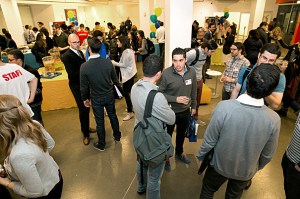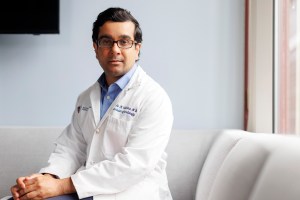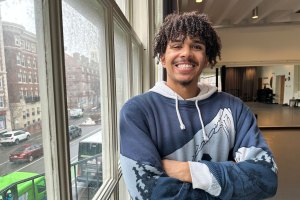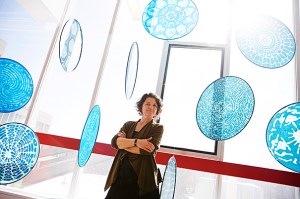All articles
-
Campus & Community
Men’s basketball receives No. 13 seed in NCAA tournament
The Harvard men’s basketball team, with a No. 13 seed, will play No. 4 North Carolina on Thursday in the NCAA tournament.
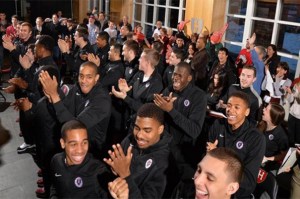
-
Campus & Community
Dancing again!
The Harvard men’s basketball team is going dancing again after defeating Yale Saturday afternoon, 53-51, in a one-game playoff at The Palestra to decide the Ivy League’s automatic bid to the NCAA tournament.
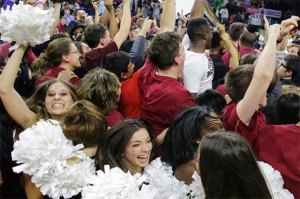
-
Campus & Community
Women’s hockey heads to Frozen Four
After beating Quinnipiac, Harvard (26-5-3) moves on to face the No. 2 seed Boston College Eagles in the Frozen Four on March 20 at Riddler Arena in Minneapolis, Minn.
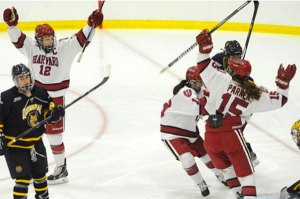
-
Campus & Community
Women’s hockey hosts Quinnipiac in NCAA Quarterfinals
The NCAA quarterfinals will be streamed live and for free on the Ivy League Digital Network. Fans can access live stats here, as well.
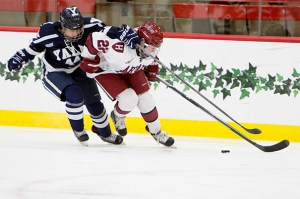
-
Campus & Community
Men’s hockey downs Yale, 3-2, in quarterfinals
The Harvard men’s hockey team took the first step toward advancing in the ECAC tournament when they downed Yale Friday at Ingalls Rink, 3-2, in the first game of the quarterfinals.
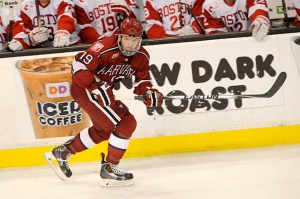
-
Campus & Community
Earning a bachelor’s degree the new way
Jonathan Haber documented his year of studying philosophy, detailing his experience completing the equivalent of a bachelor’s degree using Massive Open Online Courses, or MOOCs, and other forms of free learning.
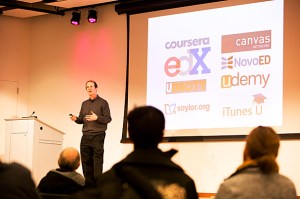
-
Health
Brains or skin?
A protein that is necessary for the formation of the vertebrate brain has been identified by researchers at the Harvard Stem Cell Institute (HSCI) and Boston Children’s Hospital, in collaboration with scientists from Oxford and Rio de Janeiro.
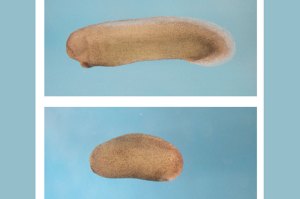
-
Campus & Community
Day of destiny
Despite the lingering snow in the Yard, Housing Day was in full effect on Thursday as freshmen learned where among the 12 undergraduate House communities they will live, study, and form friendships over the next three years.
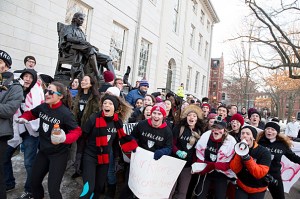
-
Campus & Community
New VP for public affairs and communications
Paul Andrew has been appointed the University’s vice president for public affairs and communications, President Drew Faust announced today. As vice president, Andrew will guide the University’s work not only in communications but also in public affairs, including government and community relations, as well as the digital domain.
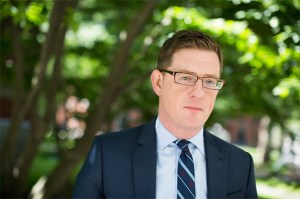
-
Campus & Community
One-game playoff with NCAA bid at stake
Collegiate athletics’ oldest rivals will meet at the famed Palestra with an NCAA tournament berth on the line as the Harvard men’s basketball team and Yale square off in a one-game playoff Saturday.
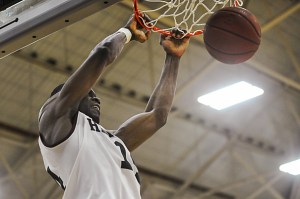
-
Campus & Community
HBS Professor Emeritus Walter J. Salmon, 84
Legendary Harvard Business School (HBS) Professor Walter J. Salmon, M.B.A. ’54, D.B.A. ’60, long one of the world’s leading experts on retailing, retail distribution, and marketing, died on March 8 at Beth Israel Deaconess Medical Center in Boston from complications of a stroke.
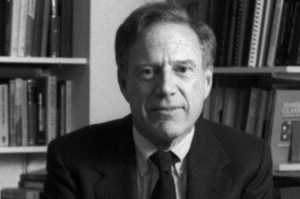
-
Science & Tech
Staying power for shale gas
The shale gas boom, which has transformed domestic and global energy markets, is still in its infancy, according to the chair of Harvard’s Department of Earth and Planetary Sciences.
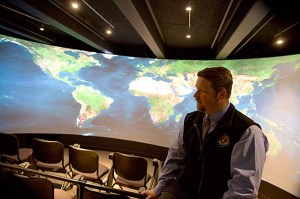
-
Campus & Community
Lessons in the power of theater
The American Repertory Theater (A.R.T.) and Harvard’s Public School Partnerships brought local students to campus to view, and share thoughts on, A.R.T.’s production of Suzan-Lori Parks’ “Father Comes Home From the Wars (Parts 1, 2, & 3).”
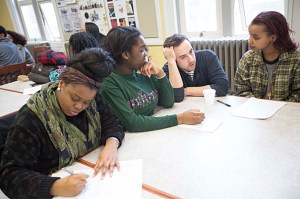
-
Arts & Culture
Making print modern
In an age of bits and bytes and pixels and text on screens, Harvard Design Magazine — relaunched in a new format last year ― fervently embraces the thingness of print, the quotidian actuality of paper and ink.
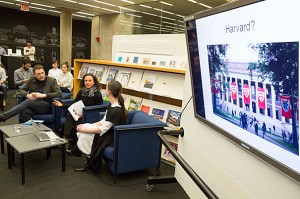
-
Arts & Culture
Revealed in verse
Henri Cole is working on a new collection of poems while a fellow at the Radcliffe Institute for Advanced Study.
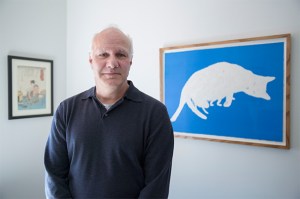
-
Nation & World
Explaining ‘Capital’
Acclaimed French economist Thomas Piketty discusses his landmark text, “Capital in the Twenty-First Century,” one year after its publication in English.
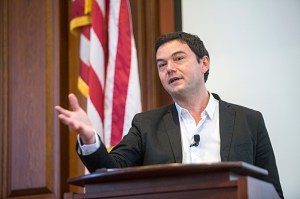
-
Campus & Community
The magic to breaking down barriers
Shaun Harper, executive director of the Center for the Study of Race and Equity in Education at the University of Pennsylvania, addressed “Fostering an Inclusive Campus Environment: From Magical Thinking to Strategy and Intentionality” as the inaugural presenter for the Harvard College Visiting Scholar Program on March 5.
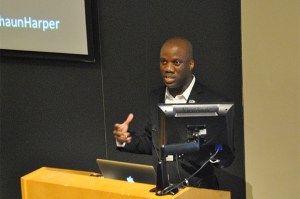
-
Campus & Community
Hidden Spaces: Where time stands still
Harvard Medical School’s light-filled Gordon Hall reflects how students once learned.
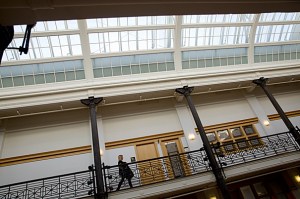
-
Arts & Culture
The wrong way forward
In May, Matt Aucoin’s “Crossing” will premiere with the American Repertory Theater as part of the theater’s commemoration of the 150th anniversary of the Civil War.
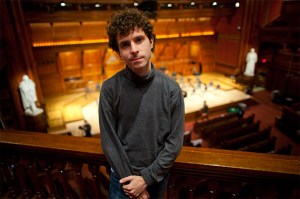
-
Health
The teeth tell a tale
A new study shows that the teeth of early hominins grew unlike those of either modern humans or apes, suggesting that neither can serve as a useful proxy for estimating the age or developmental progression of juvenile fossils.
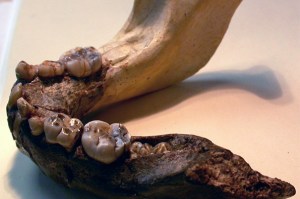
-
Health
Case of the rotting mummies
Chilean preservationists have turned to a Harvard scientist with a record of solving mysteries around threatened cultural artifacts.
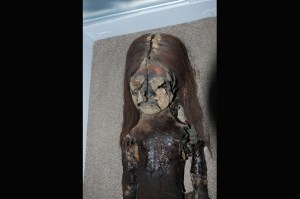
-
Campus & Community
Twenty team finalists named in Deans’ Challenges
Harvard University announced 20 student-led teams on Monday as finalists in four Deans’ Challenges focused on cultural entrepreneurship, health and life sciences, the food system, and innovation in sports.
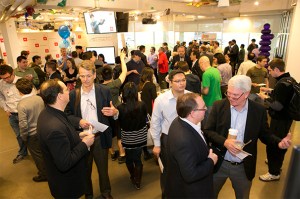
-
Campus & Community
Crimson holds off Brown, 72-62, shares Ivy title
The Harvard men’s basketball team did its part with a 72-62 win over Brown Saturday night at Lavietes Pavilion and Dartmouth returned the favor, upsetting Yale 59-58 to give the Crimson a share of the Ivy League championship and force a one-game playoff to decide the Ancient Eight’s bid to the NCAA tournament.
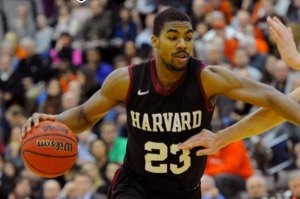
-
Campus & Community
Men’s basketball suffers setback to Yale, 62-52
Steve Moundou-Missi posted a double-double, scoring 21 points and grabbing 10 rebounds, but the Harvard men’s basketball team fell to Yale in front of a sold-out Lavietes Pavilion crowd Friday evening, 62-52.
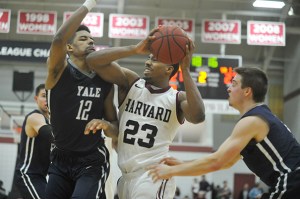
-
Campus & Community
Remembering, and returning to, Selma
Harvard President Drew Faust delivered Morning Prayers on Friday, offering those gathered in Appleton Chapel for the solemn service a deeply personal reflection on her experience with the Civil Rights Movement 50 years ago.
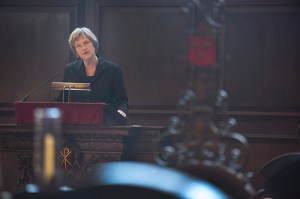
-
Campus & Community
Making the most of meals
Harvard University recently launched an effort to address chronic hunger among its neighbors in Cambridge and Boston by partnering with the local nonprofit Food for Free to donate nearly 2,000 nutritious meals each week to families in need.
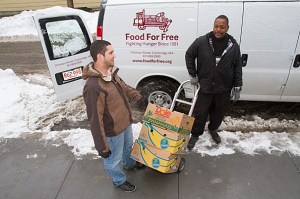
-
Campus & Community
Crowd of Fulbrights
For the second year in a row, Harvard is the leading producer of Fulbright Scholars, with 34 students ― 22 from the College, 12 in total from the Graduate School of Arts and Sciences, Harvard Law School, Graduate School of Design, and Graduate School of Education — receiving the prestigious grants.
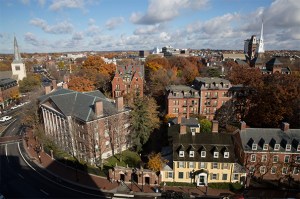
-
Health
Ebola: A long way from over
The Ebola epidemic is waning, but experts at a Harvard Medical School conference said the fight against the disease should be carried on until the last patient is cured, until more is known about the virus, and until local health care systems are robust enough to withstand another outbreak.
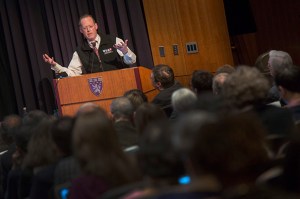
-
Campus & Community
Into the finals
Ten student teams have been named finalists for the 2015 President’s Challenge, Harvard President Drew Faust announced.
